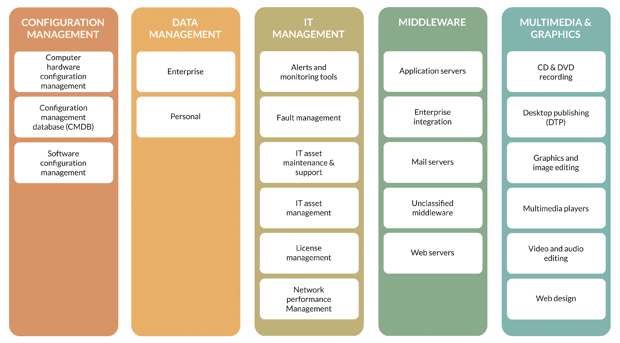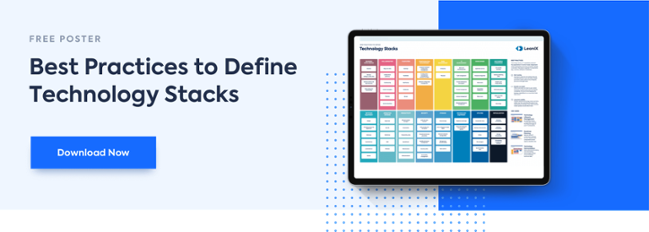
This printable infographic leverages visual technology stack examples to enable you to create the perfect tech stack for your organization.
Technology stacks or IT capability modeling is a technique that represents an organization’s IT anchor model; independent of the organization’s structure, processes, people, or domains. Whether you are in the banking industry, insurance industry, automotive, or logistics; this comprehensive technology stack is the perfect starting point.

Figure 1: Example of Tech Stacks
Tech Stack Best Practices:
Additionally, we have included tips and best practices on how to get started with technology stacks or IT capability modeling to create a complete overview of your technology landscape.
1. Don't overlap
Good tech stacks do not overlap; they are mutually exclusive. If you re able to assign your level 2 stacks without any ambiguity, you are on the right track.
2. Breadth over depth
While more levels can help to create a better structure, it comes at the cost of increased complexity. We recommend keeping your tech stacks at three levels maximum.
3. Longterm stability
Adequately defined technology stacks are fairly stable over time, preserving throughout any organizational changes. Only major IT changes should affect them.
Tech Stack Use Cases:
1. Technology obsolescence
An overview of your IT landscape which shows the lifecycle stages of your IT components.
2.Roadmap planning
See your entire IT component roadmap at once. From there, you can decide which components should replace obsolete ones.
3. Identify redundancies
Learn where youcan save costs by choosing one technology instead of having redundancies.
![The Definitive Guide to Business Capabilities [White Paper]: Learn how to create your own Business Capability Model in 4 steps, including useful business capability reports and views! »](https://no-cache.hubspot.com/cta/default/2570476/b092415a-dbc2-4bcf-aeda-77fe552f0bd8.png)



